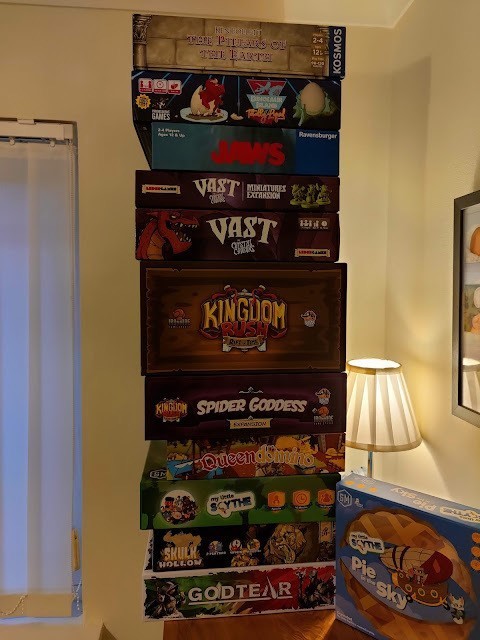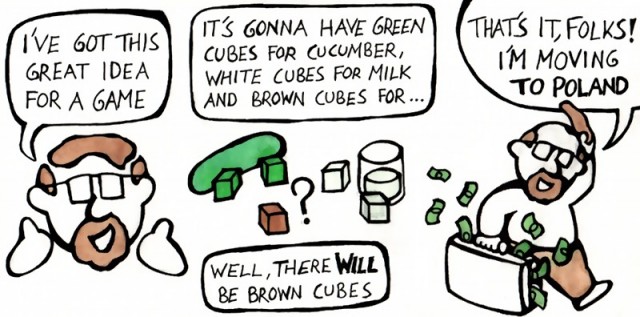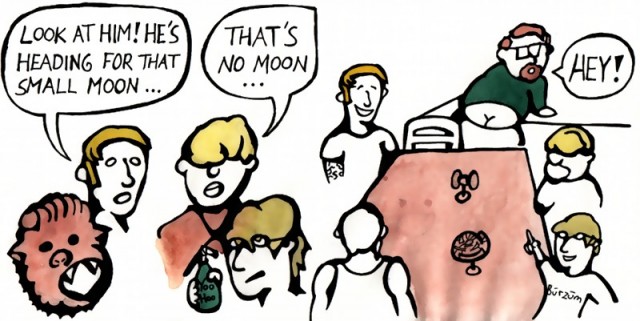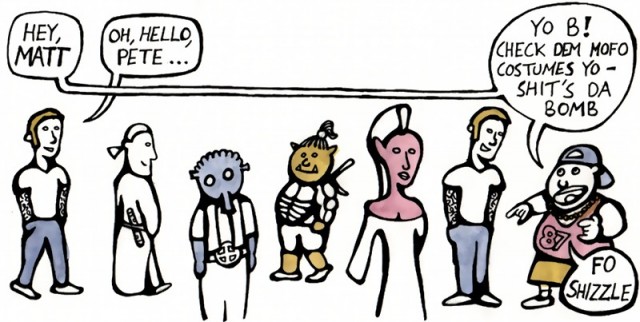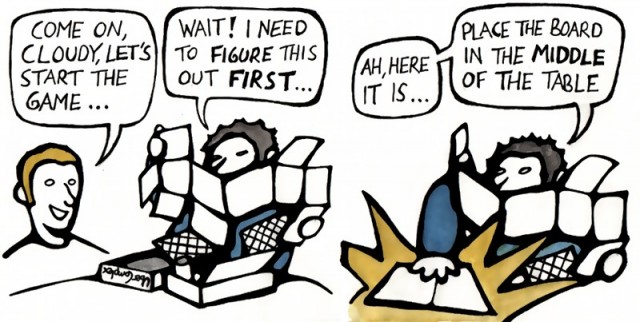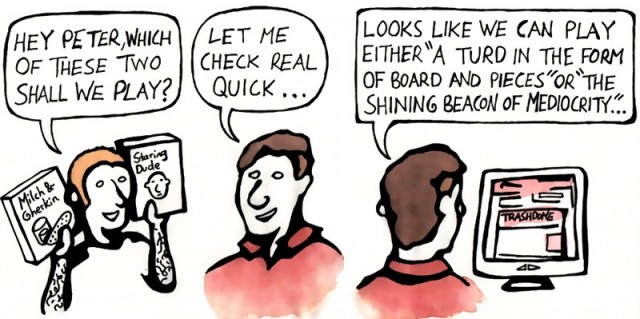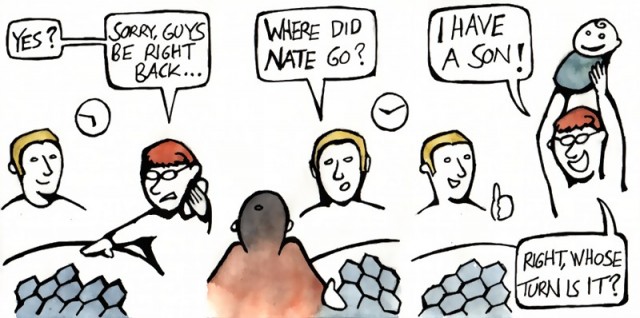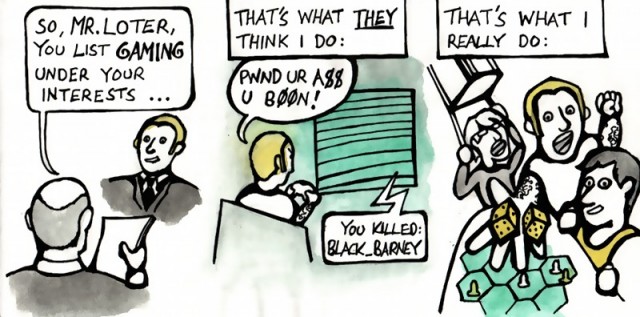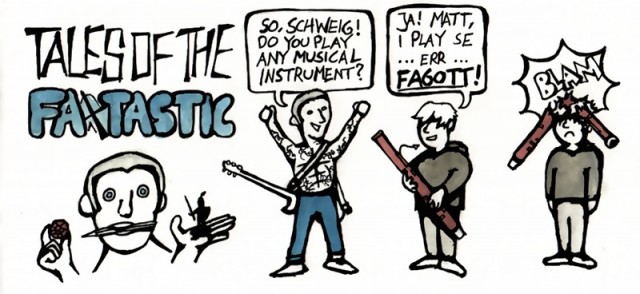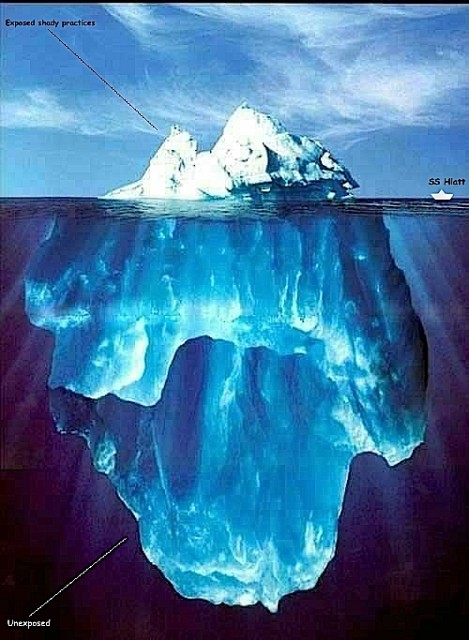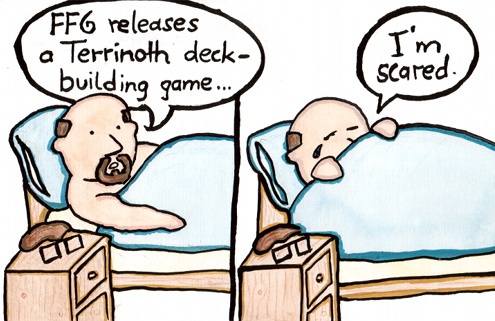It’s a common misconception that when you have kids, you don’t have much time to play games. This is untrue: you don’t actually have time to do anything. Oh you may pretend that you still get to play games. You’ll buy them and promise to play them. You’ll participate in forum discussions. But you’re now the guy who goes to game night for an hour and a half, and then leaves early. But all is not lost! You’ve figured out a way to literally create gamers, and if your anything like me (i.e. a man) it was totally painless. So what better time to get started on those budding gamers than in their youth?
Take it from a guy whose children are at this stage, there’s no such thing as “too young” when it comes to creating gamers. Kids are enthusiastic and easily fooled, which is really all we look for when we want to make someone into a gamer. Besides, you’re around them all the time. Who are you going to play games with? Your wife? I’m pretty sure mine is still angry at me from that “painless childbearing” joke. And though your children can’t yet speak, read, or perhaps even walk, there’s no reason to start them on drivel like Candyland, Cootie, or 7 Wonders, all of which are highly inappropriate for intelligent adults. No, they’re ready for the big stuff right now.
So here are some simple ways you can adapt some of your favorite games into a bonding experience with your infant and/or preschooler. Don’t be timid. Dive in there and form them in your super-cool image.
Dominion
Dominion made popular every game publisher’s favorite genre: expansions. In this classic, players shuffle cards until they are done and someone wins or something. Dominion has nearly forty expansions spread across several boxes and parallel universes, and the true collector will break the laws of time and space to procure them all. Kindly, the publisher has never provided an adequate way to store all of these cards, unless you count requiring the player to add a new wing on their house as a way. This is a good thing, because it provides what is surely the richest experience of Dominion: figuring out how to organize your cards.
This is a great time to draw your kids into this particular sub-hobby. The best part is that kids know what to do without being told. Simply follow their lead. The first step is to remove every box and dump all of the cards onto the floor. It’s just that easy! Next, get on your hands and knees and inspect each card individually. Be sure that you have just eaten a fudgesicle and wiped your hands on your bare legs. If the cards don’t stick to your knees, go eat more fudgesicles until you feel sick. Then crawl back into the room and keep sorting the cards by placing them around the living room. Our family likes hiding them under furniture and in DVD cases.
Some will recommend card sleeves for this, but I find that they detract from the full experience.
Die Macher
Die Macher is a game that captures the thrills of (wait for it) the German electoral process. This may surprise you, but German children are politically savvy enough to hold office and host highly-rated talk shows. While we Americans prefer childish men to run our country, Die Macher is a great way to teach your children that the Germans do things in a different, and therefore wrong, way. Your kids can become well-versed in such timeless issues as sitting quietly and dropping pieces on the floor.
This last part is where the real joy of Die Macher comes in. You can make a race out of it, especially if you have two children, say ages eleven months and three years. The three-year old can sit at the table and efficiently (how German!) sweep all of the cubes and cards onto your carpet. Then the race is on! How many pieces can you get before the eleven-month-old crawls around and eats every cube on the floor? Just as in the more-alluring-than-it-sounds “adult Die Macher,” you can mark the results on a dry erase board for everyone to see. If there is a discrepancy in the scoring, keep in mind that there is a way to confirm the results. It’ll just take about 12 hours, some dedication, and may require you to make sure you don’t accidentally count any cubes from other games in the results. Or you could count them, and play an exciting variation on Wallenstein, but that’s for another column.
Pandemic
Matt Leacock’s 2008 cooperative design was a grand slam with people who like to boss other people around. You must organize with your fellow players to find a way to keep the world from collapsing in a maelstrom of the sniffles and terrible nightmarish diarrhea. I can see all you parents nodding knowingly: odds are you’ve already played what I like to call Extreme Pandemic.
Extreme Pandemic is far easier than you think. Simply put your kids in daycare for about 90 seconds, and then bring them home. Their eyes should now be pink and crusty. Congratulations, Extreme Pandemic has begun. It has several advantages over vanilla Pandemic, in that the panic of spreading disease suddenly becomes far more real. Instead of passing cards to each other, you’ll get to follow your children all over the house and make sure that they don’t rub their eyes and then pick their brother’s nose. If you have already played the “Airlift” card and taken your kids to the doctor, you will have the added challenge of holding them down and spraying eyedrops all over their face. Please note that in this version, the “One Quiet Night” and “Resilient Population” cards are entirely ineffectual. You win when everyone catches it and you all need to stay home at the same time.
When that happens, you’ll reflect on how close you’ve all become thanks to board gaming. Perhaps you can celebrate by watching Go Diego Go for six hours straight and eating nothing but breakfast cereal.
Nate Owens is a weekly columnist for Fortress: Ameritrash. He drinks too much coffee and likes the Star Wars prequels. You can read more of his mental illness at The Rumpus Room.
 Games
Games How to resolve AdBlock issue?
How to resolve AdBlock issue? 